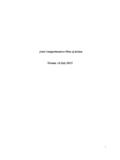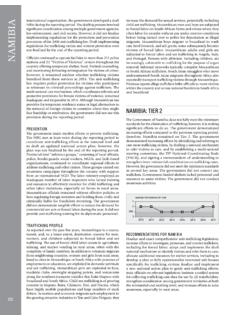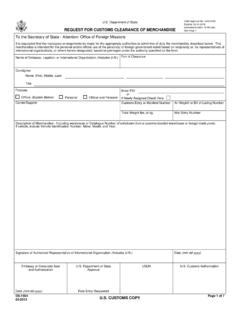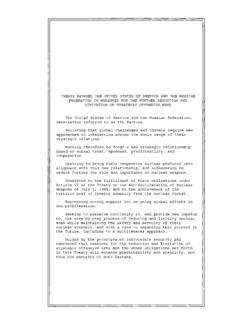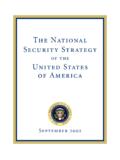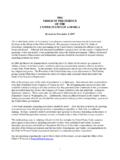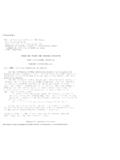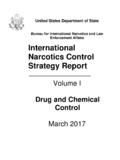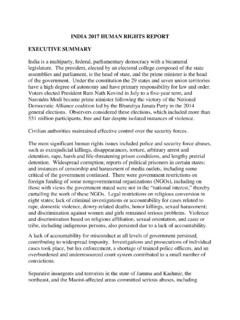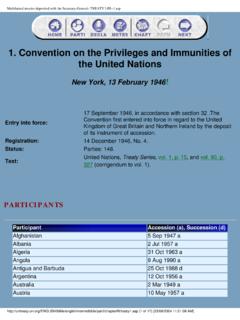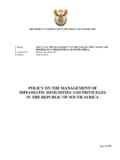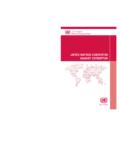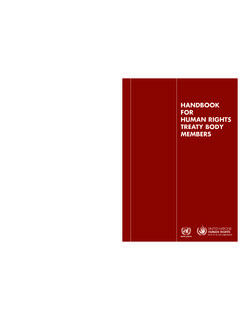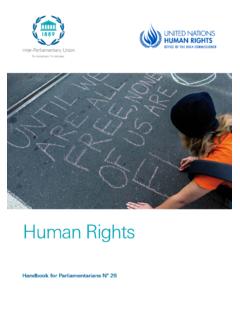Transcription of Diplomatic and Consular Immunity - State
1 UNITED states DEPARTMENT OF State . OFFICE OF FOREIGN MISSIONS. Diplomatic and Consular Immunity : Guidance for Law Enforcement and Judicial Authorities This booklet, which provides a guide to the categories of foreign mission personnel and the privileges and immunities to which each is entitled, is a joint publication of the Department of State 's: Office of the Legal Advisor Office of the Chief of Protocol Diplomatic Law and Litigation 2201 C St. NW, Room 1238. 2201 C St. NW, Room 6422 Washington, DC 20520. Washington, DC 20520 202-647-1985. Office of Foreign Missions Bureau of Diplomatic Security 2201 C St. NW, Room 2236 Protective Liaison Division Washington, DC 20520 3507 International Pl. NW. 202-895-3500 Washington, DC 20522. 202-895-3600. For urgent telephone inquiries outside normal business hours, please call the Diplomatic Security Command Center at 866-217-2089. UNITED states DEPARTMENT OF State . OFFICE OF FOREIGN MISSIONS. Diplomatic and Consular Immunity : Guidance for Law Enforcement and Judicial Authorities Contents Preface 2 I.
2 Introduction 4 II. Legal and Practical Basis of Immunity 6 III. Categories of Persons Entitled to privileges and immunities y Members of Diplomatic Missions y Members of Consular Posts (Normal and Special Bilateral). y International Organization Personnel and National Missions to Such Organizations y Designated Employees of TECRO/TECO. 16 IV. Identification of Persons Entitled to privileges and immunities in the United states y Identification Cards Issued by the Department of State y Foreign Diplomatic Passports and Diplomatic Visas: Not Conclusive for Immunity y Tax Exemption Cards: Not Conclusive for Immunity y Automobile Registration, License Plates, and Driver's Licenses: Not Conclusive for Immunity y Telephone Information and Verification 20 V. Terms and Procedures y Correct Understanding of Immunity y Personal Inviolability vs. Public Safety y Waiver of Immunity y Expulsion Procedure y Official Acts Immunity y Termination of Immunity y Archives 24 VI. Handling Incidents y Department of State Policy y General Procedures 28 VII.
3 Conclusion 29 Appendices A. Examples: Identifying Documents B. Samples of Department of State -Issued Diplomatic and United Nations Missions License Plates C. Law Enforcement Aspects Summary Chart D. Useful Telephone Numbers Preface 1. International law, to which the United states is firmly committed, requires that law enforcement authorities of the United states extend certain privileges and immunities to members of foreign Diplomatic missions and Consular posts. Most of these privileges and immunities are not absolute, and law enforcement officers retain their fundamental responsibility to protect and police the orderly conduct of persons in the United states . This booklet provides a guide to the categories of foreign mission personnel and the privileges and immunities to which each is entitled. It explains how to identify (and verify the identity of ) such persons and furnishes guidance to assist law enforcement officers in the handling of incidents involving foreign Diplomatic and Consular personnel.
4 I. Diplomatic and Consular Immunity : Guidance for Law Enforcement and Judicial Authorities 2. Introduction What Is Diplomatic Immunity ? Diplomatic Immunity is a principle of international law by which certain foreign government officials are not subject to the jurisdiction of local courts and other authorities for both their official and, to a large extent, their personal activities. The principle of Diplomatic Immunity is one officers with the general rules of Diplomatic of the oldest elements of foreign relations. and Consular Immunity and to provide them Ancient Greek and Roman governments, with specific guidance regarding the handling for example, accorded special status to of difficult situations. 3. envoys, and the basic concept has evolved and endured until the present. As a matter of The term Diplomatic Immunity is popularly, international law, Diplomatic Immunity was and erroneously, understood to refer to special primarily based on custom and international protections afforded all employees of foreign practice until quite recently.
5 In the period governments who are present in the United since World War II, a number of international states as official representatives of their home conventions (most noteworthy, the Vienna governments. Law enforcement officials, Convention on Diplomatic Relations and the however, must have a more sophisticated Vienna Convention on Consular Relations) understanding of the concept. There are have been concluded. These conventions have over 100,000 representatives of foreign formalized the customary rules and made governments, including dependents, in the their application more uniform. United states . Many of these persons may be entitled to some degree of Immunity under Notwithstanding the antiquity of the concept international law. Some of these persons are of Diplomatic Immunity , its purpose is members of Diplomatic missions, others are often misunderstood by the citizens of this assigned to Consular posts, and still others and other countries. Occasional abuses of are employees of international organizations Diplomatic Immunity , which are brought to or members of national missions to such public attention, have also served to prejudice international organizations.
6 For each of these public attitudes toward this practice. Dealing categories of persons, particular rules apply with the concept of Immunity poses particular and, even within these categories, different problems for law enforcement officers who, levels of Immunity may be accorded to different by virtue of their oath and training, are classes of persons. Most of these persons are unaccustomed to granting special privileges assigned to Washington, , and New York or concessions to individuals who break the City, but large numbers are assigned in other law. On the other hand, police officers who major cities around the country. Moreover, understand the importance of Diplomatic nearly all of these persons are free to travel Immunity may be inclined to be overly around the country either on official business generous in its application if they do not have or for pleasure. a full understanding of its parameters. It is the purpose of this booklet to familiarize police II. Diplomatic and Consular Immunity : Guidance for Law Enforcement and Judicial Authorities Legal and Practical 4.
7 Basis of Immunity The special privileges and immunities accorded foreign Diplomatic and Consular representatives assigned to the United states reflect rules developed among the nations of the world regarding the manner in which civilized international relations must be conducted. The underlying concept is that foreign representatives can carry out their duties effectively only if they are accorded a certain degree of insulation from the application of standard law enforcement practices of the host country. The United states benefits greatly from the and reduced the degree of Immunity enjoyed by concept as it protects diplomats assigned to many persons at Diplomatic missions. countries with judicial systems far different than our own. On a practical level, a failure of the authorities of 5. the United states to fully respect the immunities The various categories of Immunity are of foreign Diplomatic and Consular personnel explained below and a table is provided on may complicate Diplomatic relations between page 40 to summarize elements of paramount the United states and the other country concern to law enforcement officials, but all have concerned.
8 It may also lead to harsher treatment a common legal foundation. While customary of personnel abroad, since the principle of international law continues to refine the reciprocity has, from the most ancient times, concepts of Diplomatic and Consular Immunity , been integral to Diplomatic and Consular the basic rules are currently embodied in relations. international treaties. These treaties have been formally adopted by the United states and are, It should be emphasized that even at its therefore, pursuant to the Constitution, the highest level, Diplomatic Immunity does not supreme law of the land. The government exempt Diplomatic officers from the obligation is legally bound to ensure that such privileges of conforming with national and local laws and immunities are respected by its states and and regulations. Diplomatic Immunity is not municipalities. intended to serve as a license for persons to flout the law and purposely avoid liability for law regarding Diplomatic Immunity has its their actions.
9 The purpose of these privileges roots in England. In 1708, the British Parliament and immunities is not to benefit individuals but formally recognized Diplomatic Immunity and to ensure the efficient and effective performance banned the arrest of foreign envoys. In 1790, of their official missions on behalf of their the United states passed similar legislation that governments. This is a crucial point for law provided absolute Immunity for diplomats and enforcement officers to understand in their their families and servants, as well as for lower dealings with foreign Diplomatic and Consular ranking Diplomatic mission personnel. This personnel. While police officers are obliged, 1790 law remained in force until 1978, when the under international customary and treaty law, present Diplomatic Relations Act (22 254) to recognize the Immunity of the envoy, they was enacted to replace it. must not ignore or condone the commission of crimes. As is explained in greater detail below, The principal purpose of the 1978 Act was to adherence to police procedures in such cases bring law into line with the 1961 Vienna is often essential in order for the United states Convention on Diplomatic Relations (which to formulate appropriate measures through entered into force for the United states in 1972).
10 Diplomatic channels to deal with such offenders. The 1978 Act imposed a more precise regime III. Diplomatic and Consular Immunity : Guidance for Law Enforcement and Judicial Authorities Categories of Persons Entitled to privileges and immunities 6. Members of Diplomatic Missions Diplomatic missions are traditionally the principal communication link between the country that sends them and the host country. Accordingly, the staffs of Diplomatic missions (embassies) are afforded the highest level of privileges and immunities in the host country in order that they may effectively perform their important duties. Under modern international law (reflected who perform tasks such as driving, cleaning, in the Vienna Convention on Diplomatic and/or grounds maintenance. These persons Relations), however, there are different are afforded significantly less in the way of categories of persons within each Diplomatic privileges and immunities . The privileges and 7. mission, some of whom enjoy greater immunities of each of these groups is explained immunities than others.
